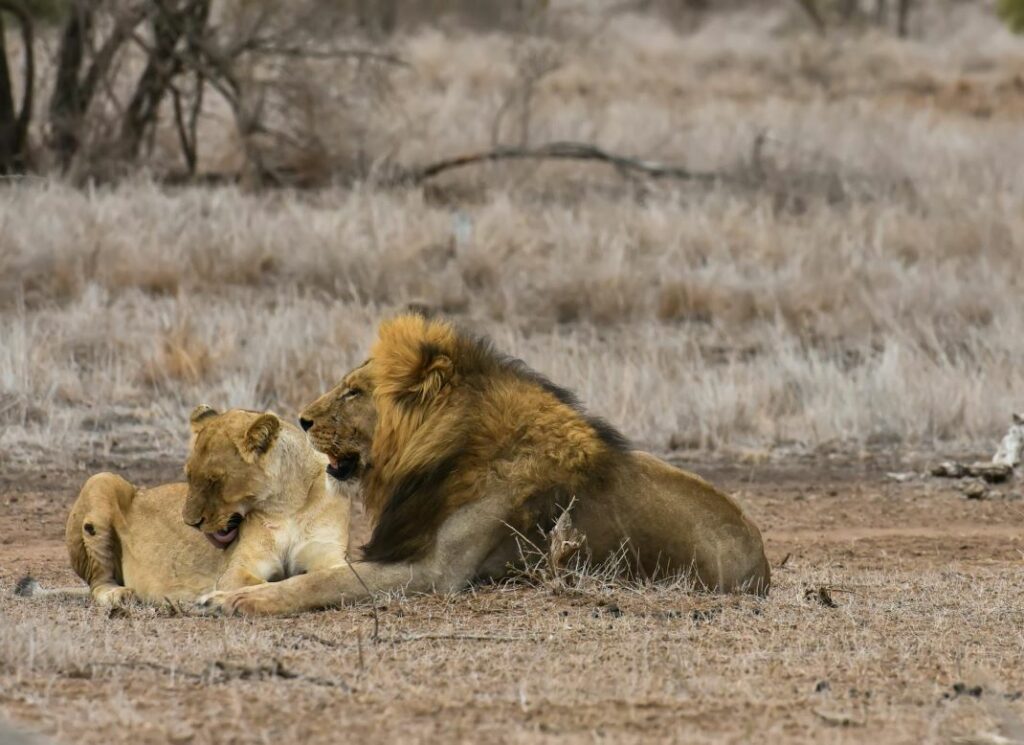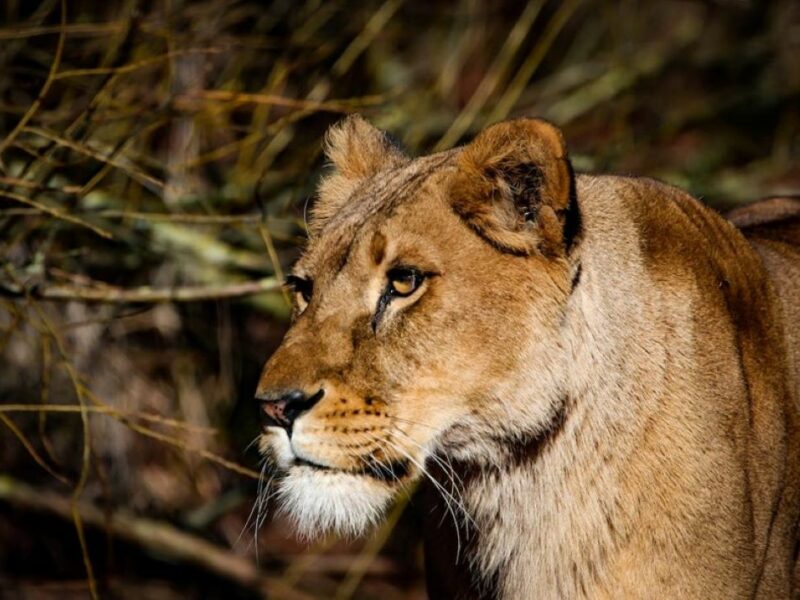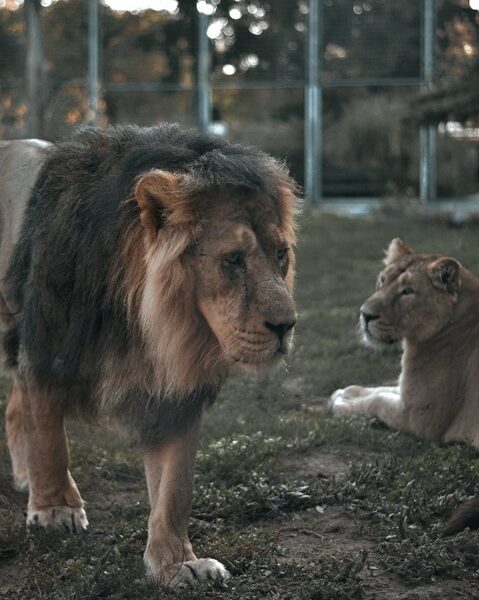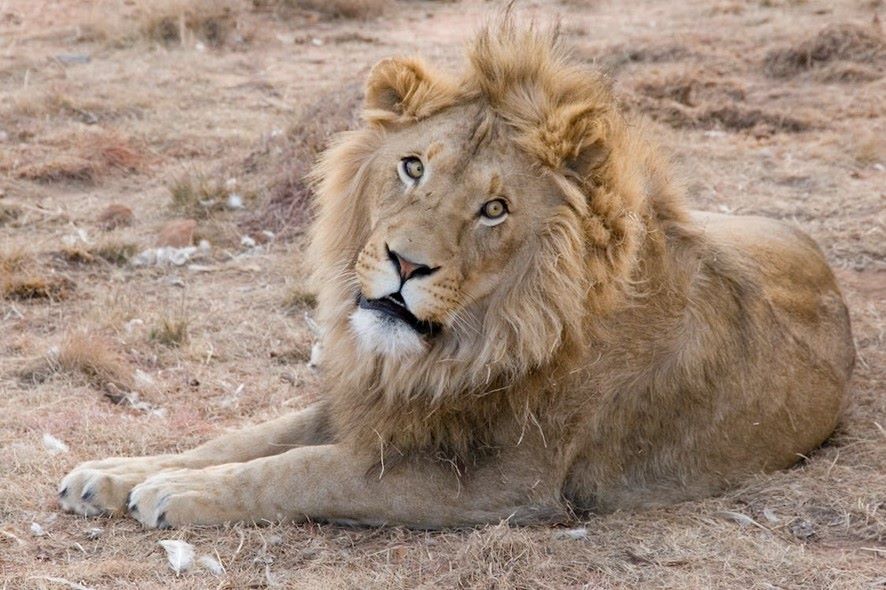If size truly mattered, the elephant would be the king of the jungle. But that honor belongs to the lion (Panthera leo). Of the African big game, the lion has been the most sought-after as a lifetime game hunting achievement. Native to both Africa and India, the lion has long been seen as a symbol of strength, power, and even a religious or cultural figure. Hunting lion in South Africa is considered one of the premier ways to go about having your chance to face off with the king of the bushveld during an exhilarating game hunting safari!
[DYNAMIC-BLOGTABLEOFCONTENT]
The King of African Big Game
When it comes to the big cats of the world, the lion is second in size to the tiger. These game hunting targets are characterized by fur coats that can range from buff to dark brown and even a yellowy red hue. So-called white lions (also available for hunting in South Africa) receive their coloring due to a condition called leucism; this is not to be mistaken for albinism, these lions are simply lighter in fur color while having normal eye and skin pigment.
These African big game animals are sexually dimorphic with males being larger and heavier than females. The average male measures 70–82 inches in length and weighs between 400 and 570 pounds. Females clock 63–70 inches in body length and a weight range of 260 to 320 pounds.
The biggest indicator of both gender and trophy quality is the mane of a male lion. When hunting in South Africa, keeping an eye on the mane of a male lion can prove whether it will be a good shot or not, these manes can vary in color from brown to rust and even black.

Locations For Hunting Lion in South Africa
Limpopo
This province, named after the famed Limpopo River, is home to roughly 80% of game hunting in South Africa. The western Bushveld (mixed wood and bush) region is transitional between the Kalahari landscape of the west and Limpopo’s eastern region, geographically known as the Lowveld.
Limpopo is home to African big game like the Big 5 and other African plains species. When hunting lion in South Africa with a focus on Limpopo, the Lowveld region is known to deliver some of the best options for “free–range” and unfenced hunting reserves that give not only good trophy prospects but also deliver great scenery.
Mpumalanga
Known for its diverse landscape, this game hunting destination is also home to a part of the Lowveld region. Much like Limpopo, Mpumalanga’s Lowveld region finds itself known as “big game hunting country” and also offers free-range hunts on both community and privately owned reserves and ranches. Annual free-range lion hunts are limited to annual quota as set by the government, remember, hunting in South Africa is strictly regulated
Northern Cape
The least populated province in South Africa is home to the Kalahari Desert and is also where South Africa’s largest river, the Orange River runs into the Atlantic. It is also home to the Nama Bushmen, said to be the best trackers for hunting in South Africa.
Game ranching areas are large and many offer controlled free-range opportunities for those wanting to choose to hunt lion in South Africa.
North West
Known as the “Platinum Province”, the North West also offers a variety of landscapes from the fringes of the Kalahari Desert to grasslands and the Magalies Mountain region. The area is renowned for offering the best of both dangerous game and African plains game for those hunting in South Africa. Lion safari hunting opportunities are offered on accredited lion ranches in the region.

Considerations when Hunting Lion in South Africa
Shot Placement And Ammunition
- Ensuring the utmost accuracy during a lion game hunting safari is not only a means of ensuring the success of your hunt but also a way for the hunt to be as humane as possible. Correct shot placement, especially when hunting dangerous game, is critical.
- The case for using the recommended caliber for lion hunting in South Africa is the same, causing unnecessary injury to a dangerous animal is both cruel and a potential safety threat.
- The legal requirement for lion hunting in Africa is a .375 caliber. A .416 Rigby or a double rifle like a 470NE or 500NE are good choices Soft expanding tips work well.
- Many hunters prefer a .458 or a .458 Lott. When on a lion hunting safari, use a rifle with good stopping power and one that you are comfortable and familiar with. Be sure to use premium-grade ammunition.
Respect for the Animal
- Lions aren’t merely trophy animals, they are apex predators with an important role in the ecology of their environment.
Using a PH and an Outfitter
- Having a professional hunter and experienced outfitter will be a huge help when hunting lion in South Africa. Their knowledge will provide a greater understanding of lion behavior and can contribute to a better success rate. Choose your PH well, ensuring that they have good experience in terms of dangerous game hunting.
Be Transparent and do your Research
- Lion hunting in South Africa can be a contentious issue, and by ensuring all legal protocols are followed you can feel at ease knowing your hunt was ethical and within the law.
Safety
- The PH and trackers will have safety protocols or practices in place for hunting lion in South Africa. Lions are wild animals and can react unpredictably to a situation, this could impact the safety of you, the PH, and anyone else on your safari hunting outing.
- Listen carefully to instructions and do exactly as your PH instructs.

Firearms – Requirements And Permits For Game Hunting in South Africa
South Africa has quite a strict and involved protocol regarding the importing of firearms for hunting purposes. Your outfitter should be able to assist you with this process, should you wish to bring your own firearm with you. Alternatively, you should be able to hire one from your African outfitter.
Permits and Licenses
- No fees are charged for the permit process, however, if you choose to have your outfitter or a third party arrange your permit, you will then need to pay a fee.
Firearms Restrictions and Allowances for Hunting in South Africa
- Hunters are allowed to bring in four firearms per person which can include 2 hunting rifles, 1 shotgun, and 1 handgun.
- 200 rounds of ammunition is the maximum allowed per firearm and the ammunition must match the firearms.
- All persons bringing firearms into South Africa must be over 21 years of age.
- Semi–automatic shotguns are allowed for hunting purposes only.
- No firearms may be brought in for personal protection reasons.
- Applicants need to complete the SAPS520 form which can be downloaded online.
- Supporting documents required include certified copies of your passport’s photo and signature page, a certified copy of your proof of firearm ownership, and a copy of your letter of invitation from the outfitter
- Proof of ownership for hunters from the United States can be a US Customs 4457 form, an invoice from the place where the firearm was bought, or an affidavit (letter) from your local sheriff confirming your ownership of the specified weapons.
- Rules and regulations do change at a moment’s notice, and we recommend liaising with your African outfitter for the most updated information.
Airport Procedures For Firearms
- On arrival, your weapons will be offloaded and taken to the baggage claim where you will be asked to identify them. They will then be collected by the firearms officer.
- While you proceed to Immigration, the firearms officer will take your weapons to the SAPS Firearms Office where they will be locked away until you arrive.
- Once you arrive at the Firearms Office you will again check the firearms (including serial number checks) and the Temporary Import Permit (SAPS525) will be issued.
Ammunition Requirements For Hunting Lion in South Africa
- The minimum requirement for dangerous game like lions when hunting in South Africa is .375.
- For the best possible penetration and shot entry larger calibers like .416 or .458 are recommended if you can handle them.
Bow Hunting
- When it comes to the choice of weapons while hunting in South Africa, it’s worth noting that bow hunting has been legal for around 40 years, and good opportunities for this method exist across the country.
- The minimum requirements for large game are a 500-grain minimum with a 60-pound minimum draw mass and kinetic energy of around 60ft/lbs.
Lion Hunting in South Africa: Method & Manner
Most of the safari hunting opportunities offered in South Africa make use of more than one game hunting method. Lions are incredibly aware of their surroundings and require that a hunter be as silent as possible as well as keeping any adrenaline rushes under control so as not to affect the quality of the shot.
Track and Stalk
- This method of hunting lions in Africa generally occurs in the Kalahari Desert landscape areas. Trackers are used and the hunt starts with a search for fresh tracks that show in which direction the lion is headed.
- This game hunting method requires a decent level of fitness because as you track on, you will need to keep up a good pace so as not to fall too far behind the lion and lose him. It also requires good focus and awareness as lions can be incredibly stealthy animals and have been known to creep up on game hunting safari expeditions.
- Because you’ll be on foot and in relatively close range, it’s of the utmost importance that your shot accuracy is the best it can be. Tracking a wounded lion is dangerous as they have been known to hide and lie in wait until a person is close enough before striking and then pounce, so make your shot count.
Baiting
- This is the most common technique for hunting lion in South Africa. The bait used will typically be an African plains game animal, such as a wildebeest, zebra, impala, and even warthog. The bait will be hung at a height that is out of reach of other predators like leopards or jackals.
- A blind will be built only once good activity is noted, alternately, the hunting party can monitor the bait at sunrise or sunset for the chance of catching the lion at the bait site.
Traveling to South Africa: Planning Your Game Hunting Safari Travels
Documents Required
- All foreigners are required to produce a valid passport that will remain valid for 30 days after departure as well as show 2 blank pages.
- No visas are required for US visitors for stays less than 90 days.
Flights
- Numerous international airlines fly directly into OR Tambo International Airport, the suggested destination within South Africa. From the US, Delta Airlines and United Airlines have various flights from some main centers.
Domestic Travel within South Africa
- From OR Tambo, flights are available to most major provincial airports and further charter flights are available when hunting in South Africa.
- Getting around in South Africa is relatively easy by air and if necessary by road when travelling within your region.
Cash Allowances
- At the time of writing, the limit is ZAR25 000 for cash entering the country
Canned Hunting And Captive Breeding: What Does It Mean For Hunting Lion In South Africa?
The practices of hunting lion in South Africa and breeding lions in South Africa are legal and there is no limit to the number of captive-bred lions that are allowed to be hunted; while the South African government only issues a few wild lion hunting permits a year.
The SCI’s View of Canned Lion Hunting in South Africa
However, Safari Club International (SCI), has taken the stance of opposing the hunting of captive-bred lions in South Africa. They no longer accept advertising from outfitters who offer captive lion hunting in South Africa and hunters who choose to hunt these lions will not be allowed to enter these game hunting trophies into the SCI record book or qualify for an SCI award. Captive lion hunts are also no longer offered via SCI competitions or raffles.
South Africa's Measures
- Banning Captive Lion Hunting in South Africa
This will involve a complete ban on the practice of captive-bred lion hunting as a way for the government to show its commitment to protecting South Africa’s wildlife.
- Phasing out lion breeding
This area is set to deal with the breeding of lions for hunting in South Africa as a way to prevent any further exploitation of the species.
- Increasing conservation activities
Legislation aims to ensure the conservation of lion habitats and improve their long-term survival in the wild.
- Boosting ecotourism activities
With the move away from captive lion hunting, South Africa will look to increase non–consumptive tourism activities that will appeal to tourists hoping to practice conservation and become an option for eco–friendly travel opportunities involving wildlife.
By taking this stance regarding hunting lion in South Africa, the country hopes to put itself in a position to show the world that it is serious about conservation and its ecological environment.

While there is no definitive deadline in place for these measures to be implemented, it’s best to expect these practices to go into place shortly, although the wheels of change do move slowly at times. This will heavily influence the prices of lion game hunting opportunities both in South Africa and in the broader African context (keeping the SCI standpoint in mind), limiting the opportunities for hunting lion in South Africa. It can see costs rise to over US$100,000.
Hunting Lion In South Africa
While hunting in South Africa isn’t going to be going away anytime soon, the threat of closure to captive lion hunting should be enough to spur you to grab these last few moments, while hunting this apex predator in South Africa is still affordable. This experience is a once-in-a-lifetime opportunity and if you are able, now is the time to seize it.
Learn more about South Africa or read about personal lion hunting experiences from members of our team.
Author: A.Baker
